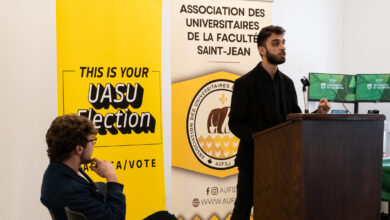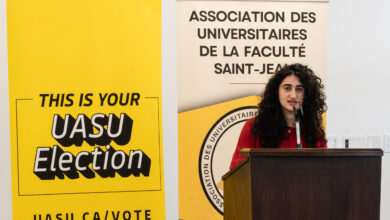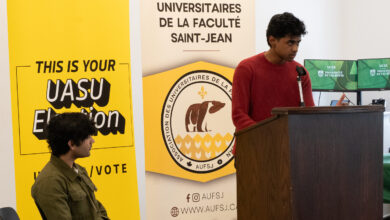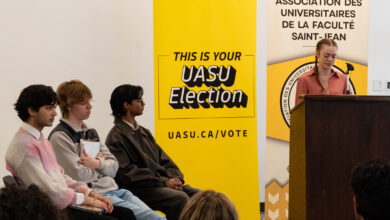Editorial: Consumerism in the Institutional Strategic Plan
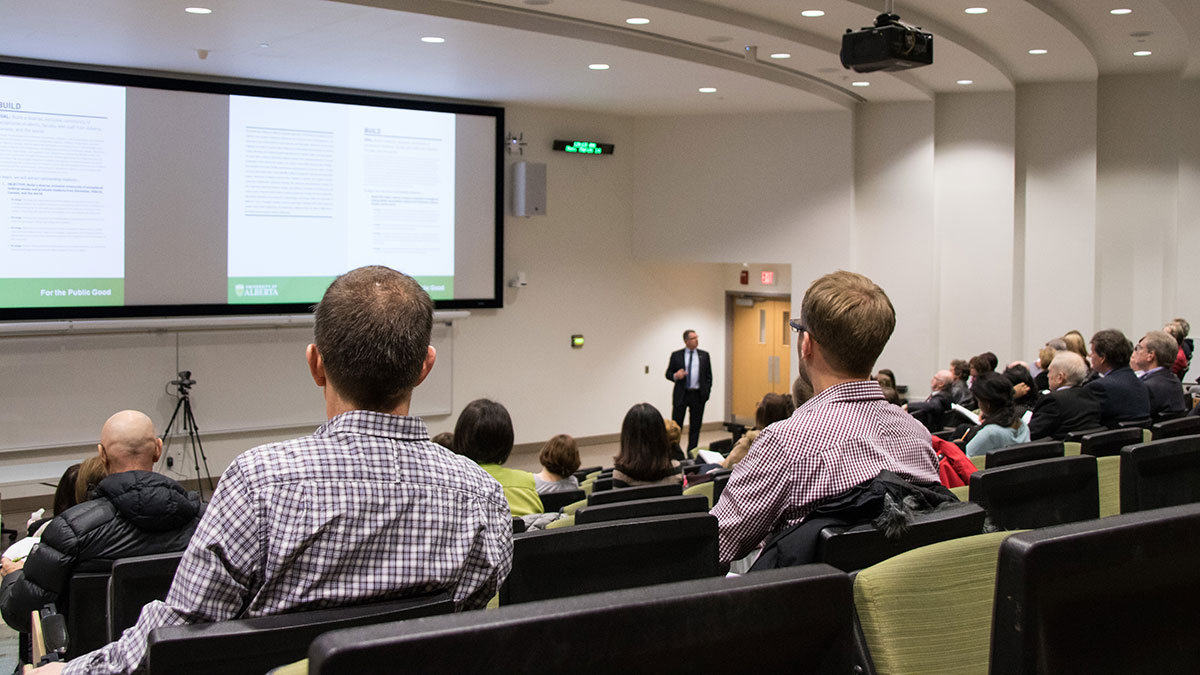 Christina Varvis
Christina VarvisDespite being in a post-PC (and post-Samarasekera) era, President David Turpin’s first draft of his Institutional Strategic Plan seems to fully embrace the producer/consumer exchange model of post-secondary education.
The Institutional Strategic Plan is a 28-page document designed, according to Turpin, to be “one strategic plan to guide all institutional, academic and administrative priority-setting, decision-making and governance” for the next 10 years. To say the least, it will become one of the U of A’s most important texts. It deserves to be read and scrutinized.
From meetings with 17 faculties, Turpin, along with Provost and Vice-President (Academic) Steven Dew, developed a Discussion Paper, which after 30+ meetings such as campus forums and round tables, 850 in-person consultations and 125+ email responses, was converted into the first draft of the Plan. The Plan consists of five themes: Build, Experience, Excel, Engage and Sustain. Each theme features a few objectives and strategies to accomplish the objectives, while an account of the “U of A’s story” separates the themes.
As expected, the Plan is a dull reading experience. Administrative rhetoric is an amalgamation of semiformal academic language and marketing terms. Redundancy abounds as certain words are overused (“excellence” appears 19 times, “engage” appears on average once per page) and objectives and strategies are often indistinguishable apart from a few altered words. “Community” (appearing 41 times) is a undefined concept taken for granted despite the contradictory and often conflicting interests of faculty, staff, students, administrators and other groups on campus.
For a text used to determine academic matters, the Plan’s outright use of marketing terms is curiously prominent. Much to the pleasure of the business-oriented (and to the suspicion of Humanities profs), the Plan begins with an appeal to the teleological with banal declarative statements: “We seek knowledge. We educate citizens. We (…) lead to positive change,” and later, “we (…) develop compelling and relevant solutions that matter.” Sentences beginning with subordinate clauses appear throughout and along with numerous three noun lists, create a kind of stultifying ambience of generalizations about what university is and what it should be. The rhetorical effect, especially of the Plan’s “U of A’s story,” isn’t unlike listening to a dictator repeat himself for an afternoon.
Ultimately, the Plan assumes that students are consumers and faculty are producers. “Student” or “students” appears 56 times and are framed within a number of discourses such as “wholeness,” implying that students aren’t whole without the product of education. Students (and faculty and staff) are also considered within global citizenship, a nonsensical concept often used by the Faculty of Arts to promote ed abroad trips. English Professor Gary Kelly is right when in a February town hall he called the idea “a sham.”
Meanwhile, faculty (29 times) and staff (21 times) are almost always together in the Plan, suggesting their operation as a single unit. Interestingly, whenever “teaching” appears in a list alongside “research,” “teaching” or to “teach” is before “research” at least twice as often. Despite a professor’s workload consisting of 40 per cent teaching, 40 per cent research and 20 per cent administration, in the Plan, teaching literally comes before research. Research is obviously important as it appears 60 times, but administration seeking “the benefits of intellectual capital arising from research” reveals what they think research should be for.
Academic labour was a common theme at the forums, and such emphasis in the Plan on teaching is interesting because the current teaching model is said to be unsustainable. Estimates of the number of sessional, contract academic staff at the U of A vary: Mark Karstad in the Faculty of Medicine and Dentistry said at a forum he thinks the percentage is about 34 per cent while Dougal McDonald in the Faculty of Education estimates it’s more like 40 per cent. McDonald explains that such workers experience “onerous conditions, including lack of job security, lack of benefits, and a general under-appreciation of their important role.” Contract staff also lack academic freedom. Rather than being considered for tenure track positions, many deserving academics must re-apply for low-paying temporary jobs every year because faculties aren’t hiring. In the first forum, English professor Julie Rak explained that the Faculty of Arts has been in a hiring freeze “for at least five years.”
The Plan promises to “stabilize long-term investment in contract academic staff” and to “continu(e) appointments based on demonstrated excellence in teaching.” Obviously many sessionals would appreciate teaching appointments, and Turpin’s Comprehensive Institutional Plan promises to increase the proportion of assistant professors from 17 per cent as it is now to 21 per cent by 2025. But such initiatives potentially jeopardize the future of tenure. Apart from mandating a few more assistant professor positions, administration has little incentive to implement a culture shift in academic labour and reverse the trend of the U of A essentially being run by what some have called the “precariat.”
The Institutional Strategic Planning Advisory Committee is interesting. Out of the 22 people involved, nine (including Turpin and Dew) have academic backgrounds in scientific fields, five in Arts, one in Business (Dean Joseph Doucet), and one in educational psychology. Three members were administrators, and three were students: an Arts grad student, a Science student, and next year’s SU President Fahim Rahman. There is obviously interdisciplinarity involved, but the fields in which one would expect to find resistance to a consumerist education model are underrepresented.
It must also be said that the Plan wouldn’t be terribly appealing to indigenous students given its emphasis on “citizenship,” a colonial concept that often conflicts with indigenous ideas of identity. Also, “consensus” shouldn’t appear in the Plan at all because even if it means “general agreement,” the word too strongly connotes unanimity to be accurate.
In short, the writers of the Institutional Strategic Plan want it to be everything when they know it can’t be.
The consumerism of the Plan isn’t in the students’ choice: students should study what and when they want. It’s consumerist when student choice dictates everything from which programs should receive funding to which programs should exist and which scholars should have jobs.
It’s the responsibility of students and faculty who are against the commodification of education or the consideration of the university’s primary purpose to provide vocational training to speak against such a model. If there’s any institution that should resist consumerism rather than succumb to it, it’s the university.

